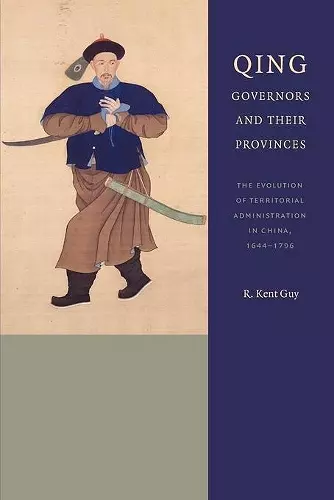Qing Governors and Their Provinces
The Evolution of Territorial Administration in China, 1644-1796
Format:Paperback
Publisher:University of Washington Press
Published:28th Feb '13
Currently unavailable, and unfortunately no date known when it will be back
This paperback is available in another edition too:
- Hardback£95.00(9780295995953)

This extremely important, solid, carefully researched, highly intelligent, and well-informed work is a much-needed contribution to the field of late imperial Chinese history, and has implications as well for China's subsequent and current history. -- William T. Rowe, Johns Hopkins University The range of this book is astounding. Guy's findings are significant both for deep historical understanding of his period of focus as well as for implications for the present day. This will be required reading, not only for scholars of the early and middle Qing period but also for those who seek historical background. -- Beatrice Bartlett, Yale University
Concentrates on the governorship system during the reigns of the Shunzhi, Kangxi, Yongzheng, and Qianlong emperors, who ruled China from 1644 to 1796. The author uses the records of governors' appointments and the laws and practices that shaped them to reconstruct the development of the office of provincial governor.
During the Qing dynasty (1644–1911), the province emerged as an important element in the management of the expanding Chinese empire, with governors -- those in charge of these increasingly influential administrative units -- playing key roles. R. Kent Guy’s comprehensive study of this shift concentrates on the governorship system during the reigns of the Shunzhi, Kangxi, Yongzheng, and Qianlong emperors, who ruled China from 1644 to 1796.
In the preceding Ming dynasty (1368–1644), the responsibilities of provincial officials were ill-defined and often shifting; Qing governors, in contrast, were influential members of a formal administrative hierarchy and enjoyed the support of the central government, including access to resources. These increasingly powerful officials extended the court’s influence into even the most distant territories of the Qing empire.
Both masters of the routine processes of administration and troubleshooters for the central government, Qing governors were economic and political administrators who played crucial roles in the management of a larger and more complex empire than the Chinese had ever known. Administrative concerns varied from region to region: Henan was dominated by the great Yellow River, which flowed through the province; the Shandong governor dealt with the exchange of goods, ideas, and officials along the Grand Canal; in Zhili, relations between civilians and bannermen in the strategically significant coastal plain were key; and in northwestern Shanxi, governors dealt with border issues.
Qing Governors and Their Provinces uses the records of governors’ appointments and the laws and practices that shaped them to reconstruct the development of the office of provincial governor and to examine the histories of governors’ appointments in each province. Interwoven throughout is colorful detail drawn from the governors’ biographies.
"His work focuses on addressing the disconnect between state-level demands and local-level events through the analysis of the appointment of and actions by governors, thereby creating a richer and much more detailed explanation of Qing governance . . ."
-- Mathew Brundage * IIAS Newsletter *"The Qing court is clearly laid out horizontally and vertically, showing how the emperors met the demands of each particular province, and how changes were made over time. Guy has thus provided a three-dimensional picture of the provincial government."
-- Ulrich Theobald * International Journal of Asian Studies *"A treasure trove of information not only about the provincial bureaucracy, but also about the different regional histories in the first half of Qing rule."
-- Andrea Janku * Bulletin of the School of Oriental and African Studies *"This book immediately establishes itself as one of the foundational works in the curriculum of Qing history, and should be ready by all students of that subject at the earliest opportunity."
-- William T. Rowe * Frontiers of History in China *"Through meticulous research . . . Guy grapples with the major tensions that criss-crossed the early Qing state . . . There is enough insight in these pages to satisfy even the most demanding Qing political junkie."
-- Mark C. Elliott * The Journal of Asian Studies *"Kent Guy's institutional study of the Qing governors is an exceptionally fine work, characterized by clarity of analysis and presentation and by depth and breadth of research."
-- Jane Kate Leonard * China Review International *"Careful scholarship and graceful prose mark this deep analysis of the administrative system of one of the most effective dynastic regimes in history. . . . Indispensible for historians of the Qing, this book should also be read by political scientists interested in contemporary Chinese governance and comparative imperial administration. Summing up: Essential."
* Choice *"For specialists the book is a mine of information and a reminder of the scale and magnitude of the Qing state and its empire by 1800. For non-specialists, Guy's historical analysis of Manchu and Chinese provincial governors in perpetual motion is the proper tonic to put to the still smoldering conceits that survive from G. W. F. Hegel's, Karl Marx's, and Max Weber's fantasies of an unchanging 'Celestial Kingdom' going nowhere very fast."
* American Historical ReviISBN: 9780295992952
Dimensions: unknown
Weight: 816g
474 pages
New Edition